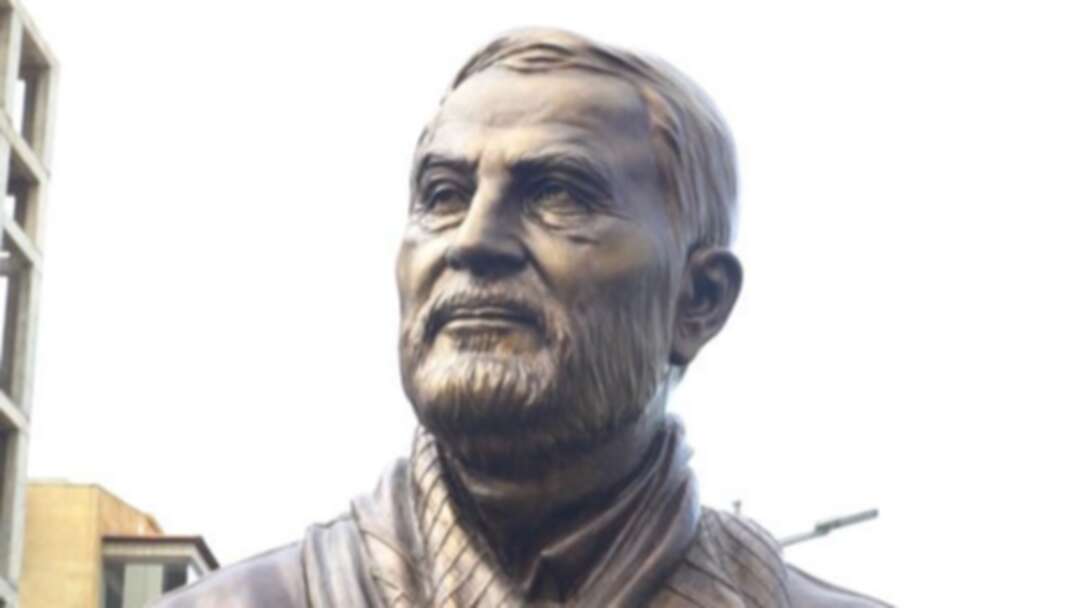-
Lebanon’s Hezbollah erects Soleimani statues, dividing supporters on Iran propaganda

Traditionally adorned with pictures of Iranian proxy group Hezbollah’s martyrs and leaders, the southern suburbs of Beirut, the party’s bastion, are now lined with Iranian Revolutionary Guard Corps (IRGC) iconography, but many of the terrorist organization’s supporters have remained opposed to the move.
Statues, billboards and posters of IRGC Quds Force commander Qassem Soleimani – killed by US airstrikes in Iraq in January 2020 – have been erected across the suburb’s populous neighborhoods as well as on the highway connecting the international airport to the capital Beirut.
Many Lebanese have decried Hezbollah’s campaign, viewed as a symbol of Iranian domination of Lebanon. Hezbollah’s popular base is no stranger to the debate, with many long-time supporters of the terrorist organization opposed to what they criticize as a provocative campaign to other Lebanese communities at a time when the country is suffering an unprecedented economic and political crisis.
“Despite Iran’s support to our struggle against Israel, we should not erect pictures of Iranian military or symbols, if that is perceived as offensive to a large tranche of the Lebanese population, at a time when the country is facing so many political and economic challenges,” Ali, a nurse hailing from Dahieh, the colloquial name referring to the Southern suburbs of Beirut, said.
On the eve of the anniversary of Soleimani’s death, Hezbollah engaged in a wide campaign celebrating the Iranian commander “martyrdom” against the Americans. Hezbollah militants were also seen distributing posters and headbands featuring Soleimani’s name with the mention “Jerusalem and Karbala are his destiny”.
In the southern Lebanese village of Arabsalim, a model depicting the moment a US drone missile struck Soleimani’s vehicle on its way out of Baghdad’s airport was placed on the main road. The militant group also erected a statue of the Iranian General in the southern Lebanese town of Maroun al-Ras. The bronze bust of Soleimani, was also placed in Ghobeiry, in the southern suburbs by the local municipality, to commemorate the general’s death.
Ahmad, a grocery store owner, echoed the Ali’s statements, noting that placing the general’s pictures in areas outside of Hezbollah’s natural dominion would only infuriate other Lebanese and further marginalize Shiites.
Iranian cultural colonialism
Other Shiites view the commemoration of Soleimani’s death as a form of cultural colonialism. “As a victim of the Israeli invasion of South Lebanon, I support the Resistance
Lokman Slim, an anti-Hezbollah activist, emphasized that while a section of Hezbollah’s traditional popular base may criticize the party’s increasing pro-Iranian propaganda in Lebanon, few publicly oppose it. “Shiites may view these theatrics as provocative to other Lebanese, but they remain part of a silent opposition, which only criticizes the party behind closed doors,” Slim said.
Amal, a beautician living in the southern suburbs explained that no one can challenge the creeping Iranian influence in southern areas. “We may not be happy with it, but we have no other choice but to accept it,” she added fatalistically.
For anti-Hezbollah activist and Janoubia editor Ali Amine, Hezbollah’s latest campaign in commemoration of Soleimani’s death aims to root Lebanese Shiite identity in Iranian military and religious references.
“Hezbollah has done much more in terms of propaganda for the death of Soleimani than for after the killing of its own commander Imad Mughnieh. Hezbollah is attempting to impose and normalize Iranian cultural references on its Shiite constituency,” he added.
source: Mona Alami
Levant
You May Also Like
Popular Posts
Caricature
opinion
Report
ads
Newsletter
Subscribe to our mailing list to get the new updates!






















